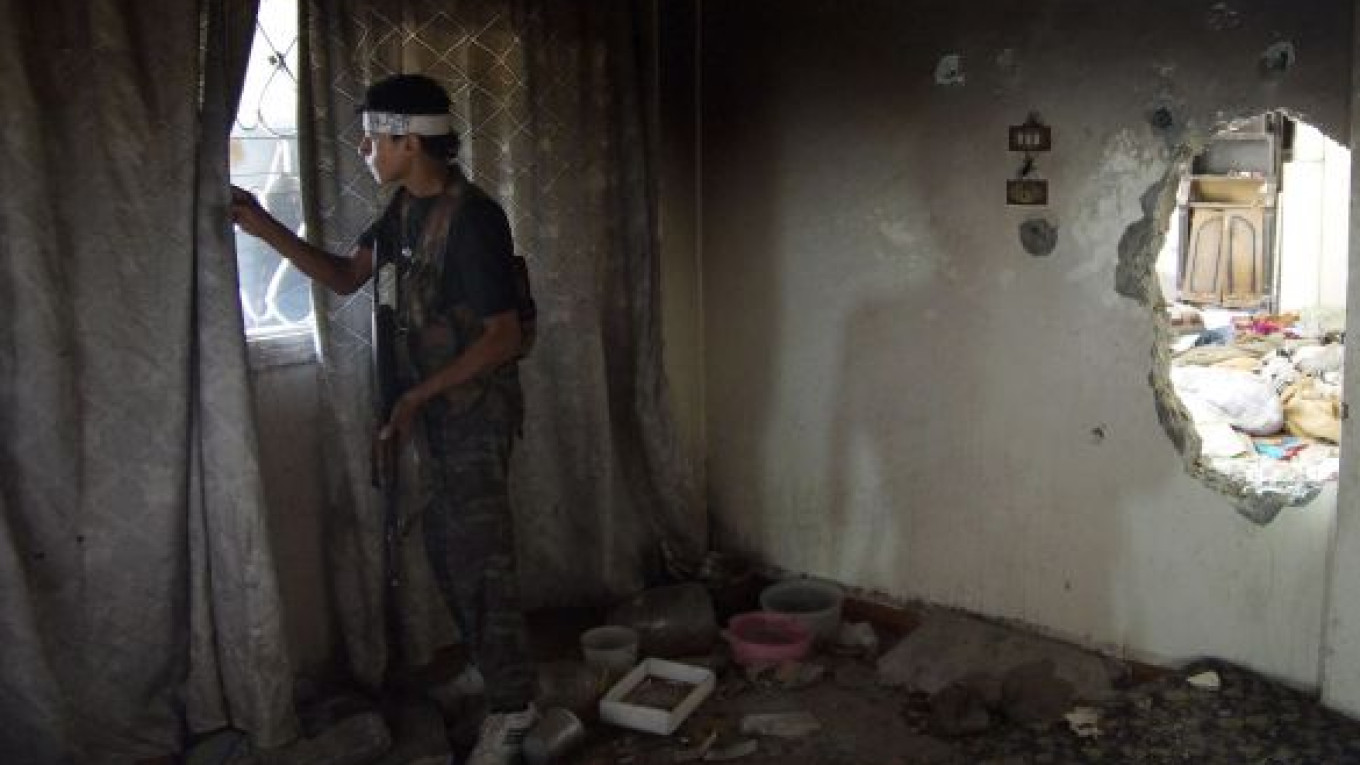The U.N. Security Council should wait for inspectors to present their report on an alleged chemical weapons attack in Syria before considering a response, a senior Russian diplomat said Wednesday.
The remarks by Deputy Foreign Minister Vladimir Titov showed that Russia opposes a plan by Britain to put a draft resolution to the Council on Wednesday authorizing "necessary measures" to protect Syrian civilians.
"It would be premature, at the least, to discuss any Security Council reaction until the U.N. inspectors working in Syria present their report," the Interfax news agency quoted Titov as saying.
Since the Syrian conflict began in 2011, Russia, along with China, has used its veto power in the Security Council three times to block Western-backed resolutions condemning President Bashar Assad and intended to press him to end the violence.
The United States and its Western allies are gearing up for a probable military strike to punish Assad, whom they blame for the alleged chemical attack last week that activists said killed hundreds of people as they slept.
Russia says it suspects rebels may have carried out the gas attack to provoke outside armed intervention and says any use of force without U.N. approval would violate international law.
Russia has also said it will not allow a repeat in Syria of what happened in 2010 in Libya, where NATO air strikes helped rebels topple Moammar Gadhafi after Moscow let a U.N. resolution authorizing military intervention pass by abstaining.
Monkey With a Grenade
President Vladimir Putin and other officials accuse the United States of using human rights concerns as a pretext to support the ouster of Middle Eastern leaders Washington wants to remove from power for geopolitical reasons.
"The West behaves like a monkey with a grenade in the Islamic world," Deputy Prime Minister Dmitry Rogozin tweeted.
"Whatever Washington says, the aim of a military operation [would be] regime change in Syria through the destruction of its military potential," tweeted Alexei Pushkov, who heads the international affairs committee in the lower parliament house.
Russia has also likened Western preparations for a probable strike on Syria to the U.S.-led invasion of Iraq in 2003, when the White House used what turned out to be false intelligence about weapons of mass destruction to justify military action.
In a phone conversation Tuesday, Foreign Minister Sergei Lavrov rejected U.S. Secretary of State John Kerry's assertion that the Syrian government was to blame for the alleged chemical attack, the Russian Foreign Ministry said.
"It's unacceptable that without waiting for the results from [inspectors], accusations are being made only against the Syrian leadership," Interfax quoted an official in Putin's advisory Security Council as saying. "Where is the proof?"
The official, who was not identified, said a military strike on Syria would be likely to unleash "uncontrollable chaos in the greater Middle East and strengthen the position of extremists and terrorist groups including al Qaeda".
The Foreign Ministry, in a separate statement that made no mention of a possible Western strike on Syria, said Russia was taking "all necessary steps" to provide for the security of its diplomatic missions in Syria.
Interfax, citing a Russian naval source, reported that Russia is preparing to withdraw personnel from its naval maintenance and supply facility in the Syrian port of Tartus. The navy and Defense Ministry declined to comment.
The Emergency Situations Ministry said late Tuesday that it had evacuated 89 people who wanted to leave Syria, including 75 Russian citizens, on a flight from Latakia to Moscow. It said the ministry had flown 730 people out of Syria this year.
A Message from The Moscow Times:
Dear readers,
We are facing unprecedented challenges. Russia's Prosecutor General's Office has designated The Moscow Times as an "undesirable" organization, criminalizing our work and putting our staff at risk of prosecution. This follows our earlier unjust labeling as a "foreign agent."
These actions are direct attempts to silence independent journalism in Russia. The authorities claim our work "discredits the decisions of the Russian leadership." We see things differently: we strive to provide accurate, unbiased reporting on Russia.
We, the journalists of The Moscow Times, refuse to be silenced. But to continue our work, we need your help.
Your support, no matter how small, makes a world of difference. If you can, please support us monthly starting from just $2. It's quick to set up, and every contribution makes a significant impact.
By supporting The Moscow Times, you're defending open, independent journalism in the face of repression. Thank you for standing with us.
Remind me later.


